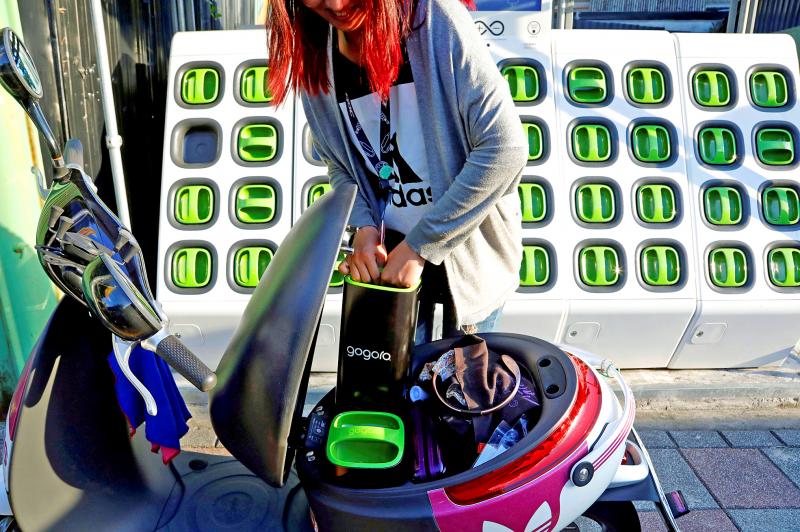Gogoro Inc (睿能創意) yesterday said it is on track to debut its shares on the NASDAQ by the end of this quarter through a merger with special-purpose acquisition company Poema Global Holdings Corp.
The Taoyuan-based electric scooter maker and battery swapping service provider made the comments after it gained Hero Motocorp, Engine No. 1 and other investors in the middle of last month, raising its oversubscribed private investment in public equity from US$257 million to US$285 million.
“We are working through due diligence for [the US Securities and Exchange Commission]. We should complete it, we hope, in the first week of March,” Gogoro chief financial officer Bruce Aitken told an online news conference. “We are on track to complete the overall transaction by the end of the first quarter. It is our goal.”

Photo: Tyrone Siu, Reuters
Gogoro shares would be listed on the NASDAQ under the stock symbol “GGR.”
Asked what attracted it to Gogoro, Engine No. 1 portfolio manager Edward Sun said that when he first met Gogoro founder and chief executive officer Horace Luke (陸學森) in 2017, Gogoro mostly focused on making hardware, or electric scooters.
Sun said he thought it might be too risky to bet on an electric scooter maker, but he became interested after Gogoro strategically shifted its business model to capitalize on selling green energy by subscription.
“Subscription is a high-margin business and is something sustainable,” he said.
The battery swapping service offered by Gogoro is a better solution than traditional charging methods, Sun said.
Furthermore, Gogoro’s new business model is “almost like the Android of the electric scooter world,” as it is forming partnerships with other vehicle makers, Sun said.
Those partnerships in China, India and Southeast Asia would greatly increase Gogoro’s chances of penetrating these emerging markets, he said.
The market size in China, India and Southeast Asia combined is 80 times larger than the market in Taiwan, he said, adding that in India, 82 percent of all vehicles are two wheelers, while the figure in Indonesia is even higher at 90 percent.
Gogoro last month said that it has teamed up with Electrum to build an electric vehicle ecosystem in Indonesia, the third-largest two-wheel vehicle market in the world, with a focus on two-wheel vehicles and developing a high-efficiency battery.
In China, Gogoro is partnering with China’s biggest scooter maker, Yadea Technology Group Co (雅迪科技集團), and Jiangmen Dachangjiang Group Co (大江集團).
Gogoro also plans to expand its reach into New Delhi by teaming up with Hero MotoCorp Ltd, India’s biggest motorcycle maker.
As an activist firm, Engine No. 1 helped ExxonMobil Corp and General Motors in slashing global carbon dioxide emissions, but Sun did not disclose any substantial plan to accelerate Gogoro’s decarbonization.
Engine No. 1 in May last year won a campaign to replace three seats on the board of Exxon Mobil, but it has no plan to take any seats on Gogoro’s board.
“Gogoro has a strong board. There is no reason to take a board seat,” Sun said.

Nvidia Corp chief executive officer Jensen Huang (黃仁勳) on Monday introduced the company’s latest supercomputer platform, featuring six new chips made by Taiwan Semiconductor Manufacturing Co (TSMC, 台積電), saying that it is now “in full production.” “If Vera Rubin is going to be in time for this year, it must be in production by now, and so, today I can tell you that Vera Rubin is in full production,” Huang said during his keynote speech at CES in Las Vegas. The rollout of six concurrent chips for Vera Rubin — the company’s next-generation artificial intelligence (AI) computing platform — marks a strategic

REVENUE PERFORMANCE: Cloud and network products, and electronic components saw strong increases, while smart consumer electronics and computing products fell Hon Hai Precision Industry Co (鴻海精密) yesterday posted 26.51 percent quarterly growth in revenue for last quarter to NT$2.6 trillion (US$82.44 billion), the strongest on record for the period and above expectations, but the company forecast a slight revenue dip this quarter due to seasonal factors. On an annual basis, revenue last quarter grew 22.07 percent, the company said. Analysts on average estimated about NT$2.4 trillion increase. Hon Hai, which assembles servers for Nvidia Corp and iPhones for Apple Inc, is expanding its capacity in the US, adding artificial intelligence (AI) server production in Wisconsin and Texas, where it operates established campuses. This

Garment maker Makalot Industrial Co (聚陽) yesterday reported lower-than-expected fourth-quarter revenue of NT$7.93 billion (US$251.44 million), down 9.48 percent from NT$8.76 billion a year earlier. On a quarterly basis, revenue fell 10.83 percent from NT$8.89 billion, company data showed. The figure was also lower than market expectations of NT$8.05 billion, according to data compiled by Yuanta Securities Investment and Consulting Co (元大投顧), which had projected NT$8.22 billion. Makalot’s revenue this quarter would likely increase by a mid-teens percentage as the industry is entering its high season, Yuanta said. Overall, Makalot’s revenue last year totaled NT$34.43 billion, down 3.08 percent from its record NT$35.52

SEMICONDUCTORS: The German laser and plasma generator company will expand its local services as its specialized offerings support Taiwan’s semiconductor industries Trumpf SE + Co KG, a global leader in supplying laser technology and plasma generators used in chip production, is expanding its investments in Taiwan in an effort to deeply integrate into the global semiconductor supply chain in the pursuit of growth. The company, headquartered in Ditzingen, Germany, has invested significantly in a newly inaugurated regional technical center for plasma generators in Taoyuan, its latest expansion in Taiwan after being engaged in various industries for more than 25 years. The center, the first of its kind Trumpf built outside Germany, aims to serve customers from Taiwan, Japan, Southeast Asia and South Korea,